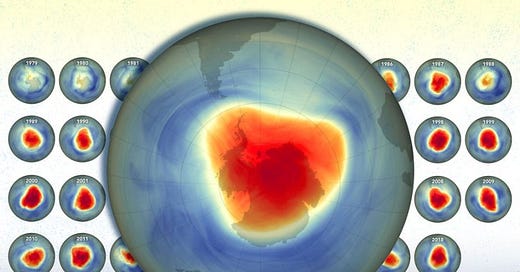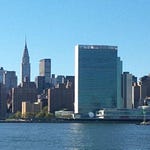Welcome to the Friday Edition of THE BRIEF.
The world is reeling with the announced tariffs by the Trump administration.
Added to that the budgets of international organisations are being cut, which has resulted in lay-offs at many UN agencies, including the UN agency for migration affairs. Many more will follow as there is no way that they can deliver the services needed without funding. Even if other countries step-up and the private sector shows proof of generosity. How is that for a gloomy Friday?
But there are beacons of hope here and there.
A new UN report points to the risks and impact of AI on employment.
Act early and disaster can be averted, they say. Let us hope that is the case.
Up-skilling will be at the center of the AI employment revolution.
On the bright side: have a weekend edition coming up with a review of the arts, UNICEF Giga strides, and gastronomy.
That will lift your spirits-up. Eat well, sleep well, and you will think well, said Virginia Wolf. And take advantage of the special offer for THE BRIEF readers by EVO Fitness Green Village. If you work-out well, exercise consistently, you will be well.
“One cannot think well, love well, sleep well, if one has not dined well.” Virginia Woolf, A Room of One's Own
Needed more than ever a the moment.
Keep your eyes peeled for our weekend editions, and subscribe, share, and like.
Presented by EVO Fitness Green Village
A great place to work-out a few steps away from the UN, ILO, WHO, UNICEF.
Chemin du Pommier 42, Kyoto Building, Grand-Saconnex, Genève
Sign up now at: http://signup.evofitness.ch/
Get THE BRIEF readers’ special offer with promo code 26D.
Bridging the AI Divide
As Artificial Intelligence (AI) continues to impact jobs and hiring patterns across industries, a question remains: is it a tool for progress or a driver of greater inequality?
The UN agency for Trade and Development (UNCTAD), in its Technology and Innovation Report 2025, urges governments, businesses, and international organizations to work together to shape artificial intelligence policies that promote inclusive development, economies, and societies.
AI is reshaping everything. From economies, to industries, to society, to the way we think. While it is a promising tool for progress in many areas it is a double edged sword as it poses risks for increasing economic inequality.
The report points to the risks to employment, and a global divide on AI.
It surveys the artificial intelligence landscape to inform decision makers to design science, technology, and innovation policies that are inclusive.
Its goal is to incentivize countries to act now by encouraging them to act on three key policy recommendations: investing in digital infrastructure, building capabilities, and strengthening AI governance.
Arguing for AI development based on inclusion and equity it calls to shift the focus from technology to people, it encourages international cooperation to strengthen and co-create inclusive AI governance.
This idea of ensuring people being at the centre of AI development coupled with international collaboration was expressed by UNCTAD’S Secretary General Rebeca Grynspan, its goal is “to shift the focus from technology to people, enabling countries to co-create a global artificial intelligence framework.”
The report multidimensional and evidence-based approach has been designed to identify three key leverage points: infrastructure, data, and skills, in order to offer a broad socioeconomic perspective and to highlight the need to build resilient infrastructure and promote inclusive and sustainable industrialization and innovation.
It begins by documenting the significant concentration in artificial intelligence development in a few companies and countries, and identifies extensive gaps in digital infrastructure.
This points to the risk of widening inequalities both within and among countries.
Then, it explores productivity and workforce dynamics focusing on economic growth and decent work.
It analyses this through both a national and international perspective, where the national perspective report analyzes the requirements and policies needed to support adoption, adaptation, and development of AI.
Additionally, it is structured in five core themes; AI at the technological frontier, leveraging AI for productivity and worker’s empowerment, preparing to seize AI opportunities, designing national policies for AI, and global collaboration for inclusive and equitable AI.
Within its main findings, the report highlights the staggering growth of AI, predicting that its global market value will approach $4.8 trillion by the year 2033. Yet, they note that there is a market inequality, whereby access to artificial intelligence infrastructure and expertise remains concentrated in a few economies and companies.
Companies such as Apple, Nvidia and Microsoft, are dominating the market, and 100 firms — mainly in the US and China — account for 40% of the market.
This clear trend of market dominance showcases technological divides and leaves many developing nations to miss out on the benefits of artificial intelligence. This in turn, as UNCTAD reports, prompts economic, societal, and digital inequality.
Another main finding raised in the report is the impact of artificial intelligence on unemployment, as they found that 40% of global jobs are impacted, requiring proactive labour policies. Jobs can be replaced by AI by way of automation, favoring capital over labour, and potentially widen inequality.
The report also points out that AI can create new industries and empower workers. Instead of eliminating employment opportunities, it maintains that investing in re-skilling, up-skilling, and workforce adaptation is essential to ensure this.
Their third main finding focuses and raises concern on the matter of a global divide.
It reported that 118 countries, mostly in the Global South, are absent from major AI governance discussions, limiting global inclusivity.
UNCTAD’s Report calls for action to address these challenges ensuring that it serves global progress, not just the interests of a few. Developing countries must invest in AI infrastructure, data governance, and education to compete in the evolving digital landscape.
The decisions and actions taken today regarding artificial intelligence will shape our landscape of tomorrow, and determine whether its benefits are shared by all or concentrated in the hands of a few. “With the right policies, AI can be a force for equality rather than division,” said Angel Gonzalez Sanz, a senior official at UNCTAD.
What does it take to become a UN humanitarian work?
We interviewed Hovig Etyemezian, Head of Innovation at UNHCR, the UN Agency for Refugees to find out about his journey and how working in the field, in the frontlines, managing refugee camps logistics, finding ways to innovate in volatile situations teaches one to be agile and resilient, qualities he brings to his role as Head of Innovation at the UNHCR in Geneva.
Presented by EVO Fitness Green Village
A place to work-out a few steps away from the UN, ILO, WHO, and UNICEF.
Chemin du Pommier 42, Kyoto Building, Grand-Saconnex, Genève
Sign up now at: http://signup.evofitness.ch/
Get THE BRIEF readers’ special offer with promo code 26D.
WWF: Deep Sea Mining Impact on the SDGs
Watch my interview with Jessica Battle, WWF Lead, No Deep Seabed Mining Initiative, where we discussed the implications of deep sea mining on global biodiversity and the sustainable development goals, highlighting the potential impacts on ocean ecosystems, fisheries, and cultural values of Pacific communities.
We also discussed the potential risks of deep sea mining, emphasizing that it is a developing industry with many uncertainties and that the International Seabed Authority is working on a regulatory framework for deep sea mining.
Watch the video above.
WWF is calling for a science-based moratorium on deep seabed mining at the International Seabed Authority (ISA), urging governments to uphold the precautionary principle and prevent irreversible damage to the deep ocean.
The lack of transparency in regulatory frameworks, coupled with limited scientific knowledge of deep-sea ecosystems, makes proceeding with deep seabed mining a reckless gamble.
“The deep sea is one of the last untouched ecosystems on Earth, playing a crucial role in regulating our climate and supporting marine life. We cannot afford to sacrifice it for short-term commercial interests. Deep seabed mining must not go ahead until the environmental, social and economic risks are understood, all alternatives to deep-sea minerals have been explored and it is proven that deep seabed mining can be managed in a way that protects the marine environment and prevents biodiversity loss and climate impacts, habitat degradation and species extinctions. Until then, a global moratorium on deep seabed mining is needed.”
UN success stories no-one talks about: saving the ozone layer
By Charles Arthur
A new MIT-led study in Nature Magazine confirms that the Antarctic ozone layer is healing as a direct result of global efforts to reduce ozone-depleting substances (ODS). When released into the atmosphere, these chemicals damage the stratospheric ozone layer, the Earth’s shield that protects people and the environment from harmful levels of ultraviolet radiation from the sun.
The new study is the first to show, with high statistical confidence, that the recovery of the ozone layer is due primarily to the reduction of ODS, rather than natural weather variability or increased greenhouse gas emissions to the stratosphere.
The reduction in the production and use of ODS is down to the implementation of the Montreal Protocol on Substances that Deplete the Ozone Layer, a landmark multilateral environmental agreement adopted in 1987.
The Multilateral Fund for the Implementation of the Montreal Protocol provides financial and technical assistance to developing countries, and its activities are implemented by four international agencies - the UN Environment Programme, the UN Development Programme (UNDP), the UN Industrial Development Organization (UNIDO) and The World Bank.
The main agency for Multilateral Fund project implementation is UNIDO, which has received over US$900 million in funding since 1993. These funds have been used to provide technical assistance in developing countries to help them phase out ODS in the foam, refrigeration, air conditioning, aerosol, solvent and healthcare sectors.
One of the authors of the Nature study, Susan Solomon, says, “There’s been a lot of qualitative evidence showing that the Antarctic ozone hole is getting better. This is really the first study that has quantified confidence in the recovery of the ozone hole. The conclusion is, with 95% confidence, it is recovering. Which is awesome. And it shows we can actually solve environmental problems.”
Source: MIT
Friday, 4 April.
Today is the International Day for Mine Awareness and Assistance in Mine Action.
At 10 a.m., the ECOSOC Management Meeting will be held at the United Nations Headquarters in New York, to conduct elections to fill vacancies in subsidiary bodies of ECOSOC and related bodies.
WTO
Friday, 4 April.
30th Anniversary of the Committee on Rules of Origin.














